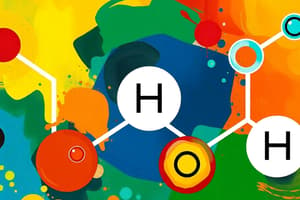Podcast
Questions and Answers
What is the primary focus of organic chemistry?
What is the primary focus of organic chemistry?
- The study of carbon-containing compounds (correct)
- The study of physical properties of elements
- The study of metals and minerals
- The study of inorganic compounds
Which of the following describes alkenes?
Which of the following describes alkenes?
- Compounds with one or more double bonds between carbon atoms (correct)
- Compounds that have triple bonds and are highly reactive
- Compounds with only single bonds between carbon atoms
- Compounds that contain only carbon and oxygen
What type of isomers have the same molecular formula but different connectivity?
What type of isomers have the same molecular formula but different connectivity?
- Stereoisomers
- Geometric isomers
- Structural isomers (correct)
- Enantiomers
Which functional group is commonly associated with alcohols?
Which functional group is commonly associated with alcohols?
What occurs during a substitution reaction?
What occurs during a substitution reaction?
Which of the following is considered a biomolecule essential for life?
Which of the following is considered a biomolecule essential for life?
What does chromatography primarily accomplish in the laboratory?
What does chromatography primarily accomplish in the laboratory?
Why is understanding organic chemistry important in nursing?
Why is understanding organic chemistry important in nursing?
Study Notes
Organic Chemistry in BSc Nursing
-
Definition: Organic chemistry is the study of carbon-containing compounds and their properties, structures, reactions, and synthesis.
-
Key Concepts:
- Hydrocarbons: Compounds consisting only of hydrogen and carbon; can be saturated (alkanes) or unsaturated (alkenes, alkynes).
- Functional Groups: Specific groups of atoms within molecules that determine the chemical reactivity and properties; examples include:
- Alcohol (-OH)
- Carboxylic Acid (-COOH)
- Amines (-NH₂)
-
Isomerism:
- Structural Isomers: Compounds with the same molecular formula but different connectivity.
- Stereoisomers: Compounds with the same formula and connectivity but different spatial arrangements (e.g., cis-trans isomerism).
-
Reactions:
- Substitution Reactions: One functional group replaces another in a compound.
- Addition Reactions: Atoms or groups are added to a double or triple bond.
- Elimination Reactions: Atoms or groups are removed from a molecule, forming a double or triple bond.
-
Biological Importance:
- Biomolecules: Organic compounds essential for life, including:
- Carbohydrates: Energy sources and structural components.
- Proteins: Made of amino acids; essential for growth and repair.
- Lipids: Fats and oils important for energy storage and cell membranes.
- Nucleic Acids: DNA and RNA, crucial for genetic information and protein synthesis.
- Biomolecules: Organic compounds essential for life, including:
-
Laboratory Techniques:
- Spectroscopy: Techniques such as NMR and IR used to determine the structure of organic compounds.
- Chromatography: Separation of mixtures based on different interactions with stationary and mobile phases.
-
Safety and Handling:
- Importance of understanding chemical properties for safe handling of organic substances.
- Proper use of Personal Protective Equipment (PPE) when working with chemicals.
-
Applications in Nursing:
- Understanding drug composition and interactions.
- Awareness of biochemical processes in the body influenced by organic compounds.
- Knowledge of organic chemistry assists in patient education regarding medication and therapies.
Definition and Key Concepts
- Organic chemistry focuses on carbon-containing compounds, exploring their properties, structures, reactions, and synthesis.
- Hydrocarbons are key compounds made solely of hydrogen and carbon; categorized into:
- Saturated hydrocarbons (alkanes) have single bonds.
- Unsaturated hydrocarbons include alkenes (double bonds) and alkynes (triple bonds).
- Functional groups are specific atom groups that define a molecule's reactivity. Common examples include:
- Alcohol group (-OH), which affects solubility and reactivity.
- Carboxylic acid group (-COOH), known for acidity.
- Amines group (-NH₂), which acts as bases.
Isomerism
- Structural isomers share the same molecular formula but differ in atom connectivity, leading to diverse properties.
- Stereoisomers have identical formulas and connectivity yet differ in 3D arrangement; this includes:
- Cis-trans isomerism, impacting physical and chemical properties.
Reactions
- Substitution reactions involve one functional group replacing another within a molecule.
- Addition reactions occur when new atoms or groups attach to a molecule with double or triple bonds.
- Elimination reactions result in the loss of atoms or groups from a compound, forming a double or triple bond.
Biological Importance
- Biomolecules are organic compounds vital for life; key examples include:
- Carbohydrates serve as energy sources and structural elements.
- Proteins, built from amino acids, are critical for growth and cellular repair.
- Lipids, including fats and oils, are essential for energy storage and membrane structure.
- Nucleic acids (DNA and RNA) carry genetic information and guide protein synthesis.
Laboratory Techniques
- Spectroscopy methods like NMR (nuclear magnetic resonance) and IR (infrared) are used to ascertain compound structures.
- Chromatography is a technique to separate mixtures based on different interactions with stationary and mobile phases.
Safety and Handling
- Understanding chemical properties is crucial for the safe handling of organic compounds.
- Proper use of Personal Protective Equipment (PPE) is essential when working with chemicals to ensure safety.
Applications in Nursing
- Knowledge of organic chemistry aids in comprehending drug compositions and interactions within the body.
- Familiarity with biochemical processes influenced by organic compounds enhances patient education regarding medications and therapies.
Studying That Suits You
Use AI to generate personalized quizzes and flashcards to suit your learning preferences.
Description
Test your knowledge on organic chemistry concepts relevant to BSc Nursing. This quiz covers hydrocarbons, functional groups, isomerism, and various reaction types. Understanding these topics is crucial for nursing students in their studies of chemistry.




